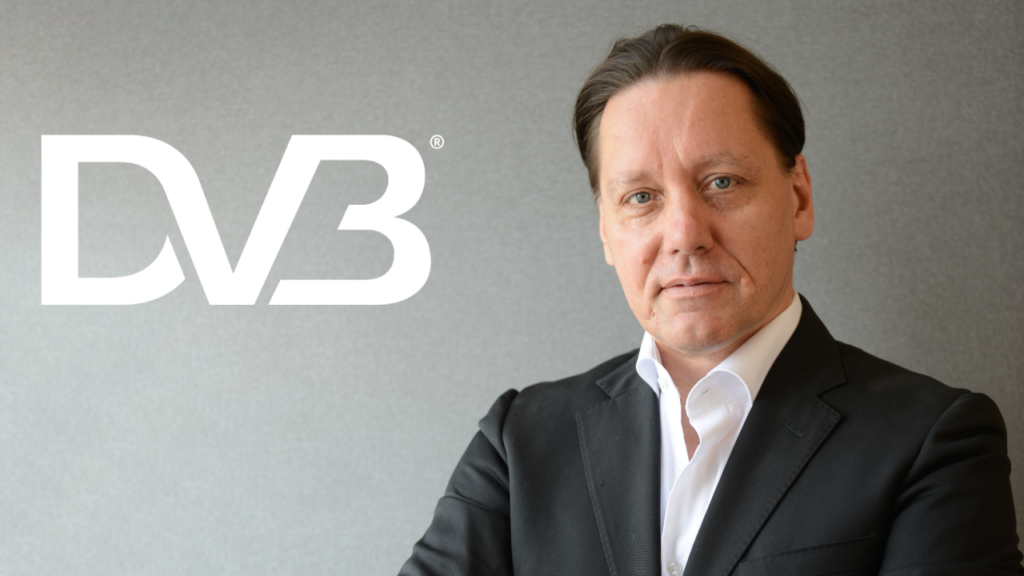
Strong today, stronger tomorrow? DVB’s role in a transformed media world
Remo Vogel, Chair of the DVB Project
I had the honour of being elected to the role of DVB Chair in July. I hold great respect for this position, as it involves stepping into the shoes of not only Peter MacAvock but also many other brilliant technicians and visionaries who shaped the technology into what it is today.
With its specifications, DVB occupies a unique position at the interface between key media stakeholders, granting it the ability to make substantial contributions.
I wonder what it would be like if the DVB logo symbolized not just broadcast and broadband standards, but a comprehensive, unified solution. What do you think? What core values and objectives should DVB adopt to reflect a future vision?
When we, as DVB, communicate today, it is often in the context of a given distribution-technology silo. Meanwhile, media managers are overwhelmed by market developments, with many having already surrendered to Big Tech players. They have lost sight of the power we, as broadcasters and content providers, hold in our own hands. Open DVB technologies, developed by our Members, not only power up to 95% of live video delivery – the relevant figure for my employer ARD’s television services in Germany – but also offer a wide range of solutions for managing the digital transition.
Broadcast & broadband
DVB has, over the years, successfully expanded its broadcast technologies to also cover broadband. Today, we offer solutions for internet-based delivery (DVB-DASH), seamless hybrid service discovery (DVB-I), and dynamic hybrid delivery (DVB Native IP). With HbbTV, we have a reliable partnership to enable the flexibility needed today with highly integrated client applications. At IBC this year, we showcase, among other things, how the world’s most promising direct-to-mobile technology, 5G Broadcast, can be fully integrated into a DVB-I service portfolio.
We maintain a robust and advanced ecosystem that encompasses technology providers, affordable clients, and a comprehensive testing infrastructure.
DVB is the technology stack for publishing digital video. I believe we need to enhance how DVB is perceived, emphasizing that the “B” in the acronym represents more than just “Broadcasting”. How do you think we should adapt DVB’s image to reflect what we already are?
Business models key
The entire media industry faces substantial challenges. Budgets for public service media and private broadcasters are shrinking, manufacturers must redefine their roles in a software-driven smart TV world, and Big Tech is disrupting established revenue models. This phase comes surprisingly late, given that the digital transformation has already overhauled entire industries, from music to banking. Perhaps this delay is a testament to the fundamentally healthy business model of the broadcast industry.
DVB supports a horizontal business model, operating within distributed markets that offer various roles and associated business opportunities. It is time for us to think more creatively about new possibilities. For instance, HbbTV’s Targeted Advertising solution (which closely complements the DVB- TA specifications) allows innovative revenue-sharing. Can we explore applying these approaches to other areas as well?
Broader challenges
Beyond our core business, there are several pressing issues, such as accessibility, sustainability, privacy and many more. Our work has significant potential to have a meaningful impact in these areas.
Consider accessibility, for example, where effort has been invested in recent years, including the introduction of accessibility signalling and forthcoming implementation guidelines. But is this enough? Where do we want to be with accessibility by 2035? Are our current approaches sustainable in the long term? And ultimately, what role should DVB play in advancing this goal?
Please don’t hesitate to bring your ideas! Events like IBC and especially DVB World are excellent for tackling complex problems. They also provide a great opportunity to find supporters for your ideas.
I will work – with you – to ensure that DVB continues on its successful path and further strengthens its role in the media technology landscape by addressing the right challenges.
This article first appeared in Issue 64 of DVB Scene magazine.
Remo Vogel is responsible for the strategic development of distribution technology for Rundfunk Berlin Brandenburg, part of the ARD network in Germany. His focus is on hybrid systems for programme publication. In addition to chairing the DVB Project, he leads DVB-I-related activities for both the EBU and the Deutsche TV-Plattform.
